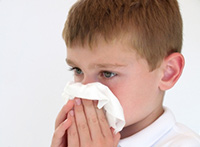I have never used Echinacea for a cold but this latest study of 700 people seems to show that it does not do much to help.
Funny thing is that lots of people swear by taking Echinacea in the first signs of a cold to reduce the symptoms and time of a common cold.
The study of more than 700 adults and children suggests the tiniest possible benefit — about a half-day shaved off a weeklong cold and slightly milder symptoms. But that could have occurred by chance.
For most people, the potential to get relief a few hours sooner probably isn’t worth the trouble and cost of taking the supplement, researchers said.
Echinacea No Help for Colds
 With no cure for the common cold, North Americans spend billions on over-the-counter pills, drops, sprays and other concoctions to battle their runny noses, scratchy throats and nagging coughs.
With no cure for the common cold, North Americans spend billions on over-the-counter pills, drops, sprays and other concoctions to battle their runny noses, scratchy throats and nagging coughs.
Some turn to echinacea (ECK-in-AY’-shuh), a top seller marketed as a product that helps the immune system fight infections.
In the past, some studies found it did nothing to prevent or treat colds; others showed modest benefit. Research on echinacea, also known as purple coneflower, is hard to compare because there’s more than one kind of plant, and different parts of it are used.
With government funding, Dr. Bruce Barrett and colleagues at the University of Wisconsin tackled the question again, using newspaper ads and posters to find volunteers with colds in the Madison, Wis., area.
The participants ages 12 to 80 were randomly assigned to get echinacea tablets, a dummy pill or no treatment at all. Those who got the herb took the equivalent of 10 grams of dried echinacea root the first day and five grams the next four days.
Twice a day, they graded their symptoms until their cold was gone.
Results of Echinacea Study
From those scores, the researchers saw a trend toward shorter and slightly less severe colds for those taking echinacea compared to those who didn’t. However, the results did not reach statistical significance, meaning they could have occurred by chance. There were no apparent side effects from the echinacea.
Barrett and other experts said the findings would probably be viewed as positive by echinacea supporters but as the “nail in the coffin” by critics.
“It’s not a compelling result in either direction,” said Mark Blumenthal, executive director of the American Botanical Council, which follows research on herbal products. He said Barrett is on the group’s advisory board.
Blumenthal said the study was well designed, used a good quality product at a reasonable dosage and tested echinacea in a real-world setting, rather than giving colds to research volunteers.
The study’s findings were released Monday by the Annals of Internal Medicine. The authors include the co-founder of the Australian company that provided the echinacea for the study, but he was not involved in the research.
It was funded by the National Center of Complementary and Alternative Medicine, part of the National Institutes of Health. The centre, set up to test herbs and other alternative health remedies, has spent US$6.8 million testing echinacea since 2002.


